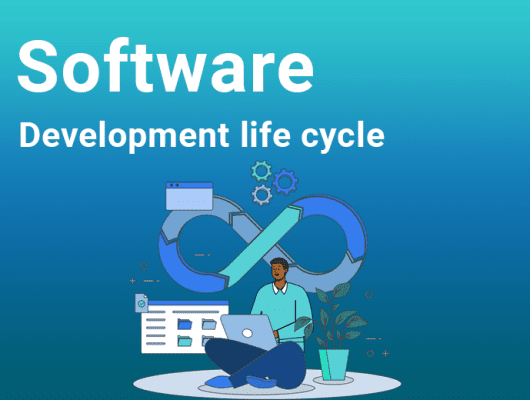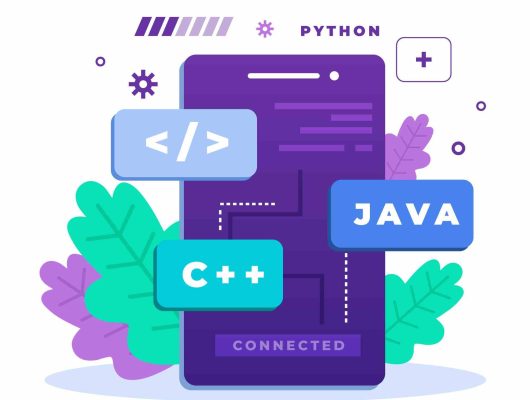
Choosing the Right Mobile App Development Approach( Professional Perspective)
With the increase in technological trends, many businesses face myriad options, each with its unique set of advantages and challenges.
Therefore, selecting the appropriate software development approach is paramount. However, finding the right approach leaves a lot of questions.
How do you decide which mobile strategy is best for your project? Are there specific criteria that should guide this decision-making process?
These questions are essential in navigating the complexities of mobile app development. Therefore, let’s uncover them for a seamless mobile application development process.
Before we begin, let’s understand the type of approaches involved in the process.
Table of Contents
1. Type of Mobile App Development Approach

App development comes with various approaches, each having its pros and cons. These mobile app development approaches include
1.1 Native App Development
Native mobile app development is a platform-specific app development that includes
few requirements
- Specific software development kit
- Use of particular programming languages based on the preferred platform
- Development environment
Benefits of Building Native Apps
- Native apps are more efficient.
- Provide platform-specific user interface development
- Support the entire OS feature
- Ensure complete control over all hardware-related functions
- Provide consistent, safe, and quick response
1.2. Cross Platform App Development
Cross-platform mobile apps are the ones that can run on multiple platforms. This technique can replace native development because it eliminates the need to build different apps for each platform.
This notion allows programs to run across several platforms using programming languages and tools other than Google and Apple’s.
Developers that follow this strategy often use JavaScript or .NET/C#-based cross-platform frameworks and tools.
Thus, a cross-platform approach for Web applications, iOS, and Android requires a single team with platform experience.
Additionally, you can release all of your apps simultaneously without sacrificing team size or timetable.
Benefits of a Cross-Platform Strategy for Development
- Consistency across all sources
- Perfect for tight budgets or limited funds
- Easy to set up
- Reduce Time to Market.
1.3. Hybrid App Development
One kind of cross-platform development is hybrid application development. This method of development involves creating the application using standard web technologies and tools, such as
- HTML5
- CSS
- JavaScript
Hybrid apps are speedy like web apps and deliver the same great user experience as native mobile apps.
Most notably, in comparison to native apps, these apps are more budget and time-friendly
Pros of Using a Hybrid Approach to Development
- Dedicated development group
- Rapid product launch
- Code portability
- Same functionality as a native app for mobile devices
- Limited Development expenses
- Capability to operate both online and off
1.4. Rapid Mobile App Development Approach
The apps with low code or no code development technology come under the Rapid Mobile App Development category.
Benefits of the RMAD Method
- Maximize ROI
- Development process simplicity
- Works with a wide variety of projects
- Development with minimal or no code
- Simple operating system
- Code repository
1.5. Progressive Web Apps
Last but certainly not least, progressive web application development is another mobile app development approach we must consider.
These apps don’t technically qualify as mobile apps; they look and work like native apps. These online apps have an intuitive and custom design that works great on mobile devices.
You can install these apps on a desktop or mobile device and operate without a traditional web browser.
Benefits Of Progressive Web Apps
- Seamless app maintenance
- utilization of a unified codebase
- High-quality User interface
- Features both online and offline functionality
2. How to Choose the Right Mobile App Development Approach
After reviewing mobile app development’s characteristics, benefits, and methodologies, let’s discuss the mobile app development approaches.
2.1. Understand the Target Audience
Before deciding on a platform, you should determine who you are trying to reach. People from all walks of life use various platforms.
Android has a larger market share and a more diverse user base, but iOS users are wealthier and happier to pay for apps.
The critical takeaway is to select an operating system with a strong presence. Choose Android over iOS if your app’s intended users live outside Western Europe, Japan, and the Americas. Your products will attract a more significant number of users.
2.2. Selecting the Right platform
Platform selection is an essential component of application development to enhance the user experience. The following are examples of the numerous software development platforms that are currently available:
- Android
- iOS
- Cross-platform application
Remember that every single platform possesses its advantages and disadvantages. Before selecting a platform, it is advisable to investigate to identify the most appropriate one.
2.3. Attractive User interface
Emphasizing UI/UX is the most crucial factor in developing the app. Therefore, to make your app interesting
- Keep the amount of text to a minimum.
- Ensure easy navigation
- Use minimalist design to ensure proper user needs
2.4. Timeframe
The amount of time needed to create an app depends upon the complexity of the app design and its platform.
Android app development can take longer owing to testing on multiple devices and OS versions. iOS can facilitate development under its compatibility with a limited number of device types.
Apart from that, the simpler the app’s design, the less time it will consume, and vice versa.
2.5. Budget and Cost
Cost and available resources are other considerations when choosing the right app development approach. You’ll need a Mac and the programming languages Swift or Objective-C to create apps for iOS.
The Android platform, in contrast, allows for more versatile development on other platforms, including Linux and Windows. So, before making a final choice, take account of your development team’s capabilities and available funds.
Moreover, note that programming language and operating system don’t affect app development costs as much as functionality and design.
2.6. Security
Security must be a top priority when devising the cornerstones of mobile application development for an organization.
Numerous individuals carry credit card numbers, login credentials, and bank account details on their mobile devices. Therefore, any user’s foremost concern would be data protection.
Hence, it is imperative to integrate the security feature into your mobile application during the design or development phase.
Always remember that the user will be more engaged with an application that offers greater security.
2.7. Testing
The next approach is to test the mobile app’s usability, functionality, and current issues. There are numerous types of mobile application testing, including:
- Functional Testing: Assists in verifying that the program operates as intended.
- Interruption Testing: Used to determine how poor internet connectivity, incoming calls, etc. affect the application’s functionality.
- Installation Testing: This helps determine how long it takes to download the app from the appropriate app store.
- Memory Testing: This helps determine how much memory the mobile app uses.
- Performance Testing: Performance testing aims to determine how effectively the app works in both ideal and idealized conditions.
2.8. Consult Mobile App Development Experts
Companies lacking an in-house mobile app consulting team should outsource mobile app development to a professional partner.
When searching for a mobile app development enterprise, keep the following in mind:
- Verify the company’s track record and portfolio of work developing apps for several mobile platforms.
- Verify if the team is proficient in the languages and frameworks the company chooses for app development.
- Determine how the technologies they employ to prototype mobile applications can be advantageous to your company.
- Knowing how to follow the current coding guidelines
- Verify that they have prior expertise integrating APIs.
- Inquire about their plans for data security during development
- Ask for their PCI-DSS certification
3. Mobile App Development Framework

After choosing a platform and identifying your most appropriate mobile app development approach , it is essential to evaluate frameworks. These frameworks include
3.1. React Native
React native by Facebook is the preferred choice of many cross platform developers. It helps in the seamless development of android and iOS applications using a single code. Many businesses like Tesla, Airbnb, Amazon and Skype integrate this framework for their software development.
Pros
- Reduces product launch times
- Reasonably priced
- Easier code reuse
- Free and open-source Compatible with iOS and Android
- Open source
- Implements one codebase
- Written in JavaScript
Cons
- Difficulty in debugging
- Slow Functionality
- Consume large spaces
3.2. Flutter
Flutter by Google is a comprehensive designing toolkit that helps in designing native apps for web, mobile and desktop. It allows the use of a simple codebase for various application development. Many renowned businesses such as Google and Abbey Road Studios prefer to use this framework.
Pros
- Facilitates rapid app development
- Adaptable user interfaces
- Hot reload alternative
- Distributed source
- Implements one codebase
- Built using C, C++, and Dart
Cons
- Absence of sophisticated features
- Extended download time
3.3. Iconic
Iconic is another widely used framework that assists in creating cross-platform, hybrid, and PWA applications using JavaScript. It helps the developers to create features rich applications.
Pros
- Offers a user-friendly interface
- Adaptable user interfaces
- Hot reload alternative
- Less expensive to develop
- Facilitates expedited prototype development
Cons
- Lag in operation of intensive applications
- Absence of hot reloading function is absent
3.4. Xamarin
Xamarin is the best possible alternative for the development of various cross platform applications. As it employs the C# programming language, it is the most straightforward framework for application development.
Pros
- Provide Multiple library support.
- Uncomplicated API integration
- Suitable for offline applications
- An open-source framework based on.NET and C# that facilitates the development of applications for Android, iOS, and other platforms.
Cons
- Difficulties with third-party libraries and applications
- Provides restricted entry to open-source libraries
- The app’s bulk is substantial
3.5. Apache Cordova
Apache Cordova is one of the developer friendly framework that use the language such as Objective-C, C#, C++, CSS, HTML, Java, and JavaScript.
Pros
- Beneficial for offline applications.
- Permits utilization of native device APIs
- Constructs code reusability
- Distributed source
- Its plugins allow the use of smart hardware features such as cameras, GPS, accelerometer.
Cons
- Unlikely for hardware-dependent applications.
- Hybrid applications run more slowly.
- Plugins may not operate in accordance with expectations
Final Crux
As technological development and production increase, the demand for mobile applications rises. These applications ought to be effective, intuitive, and user-centric.
Therefore, choosing the right strategies takes precedence. Therefore, locating a reputable app development company or developer is critical.
Consider selecting Onyxtec to obtain mobile applications of superior quality. Our team of experts smooth and user-friendly app designs and functions.
You know what’s great? You require no administrative expenses to acquire your application.
For more information contact Onyxtec.
FAQ
1. Define Low Code Development and No Code Development?
Low Code Mobile applications that contain minimum coding abilities. They utilize the drag-and-drop features for graphical user interface.
2. What are the types of Mobile App?
There are four types of mobile application
- Native app
- Hybrid app
- Web app
- Progressive app
3. What are the best strategies for app monetization?
The ideal approach for app monetization includes
- Use of in-app advertisement
- Offering Subscriptions
- Opt for in-app purchases.




